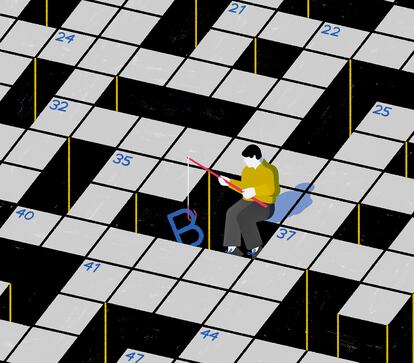Unfiltered thoughts: What if we voiced everything we think?
We are bound by language, which imposes constraints on our self-expression. Yet, only through words can we find our voices and liberation

Expressing our true thoughts can be a risky endeavor, as words have the power to transform everything and vice versa. When we assign a name to something or someone, we not only acknowledge its existence but also confine it within boundaries, like carving it in stone. Increasingly, people run into trouble with loved ones, peers and coworkers for voicing their opinions, particularly concerning political beliefs. Many journalists, writers and activists suffer severe consequences like being canceled for speaking out or simply due to suspicions about their intentions. Our words appear to have lost their freedom, now swayed more by authority mandates than the principles defined in dictionaries.
One example among many is the first volume of The Memoirs of Elias Canetti: The Tongue Set Free. Elias Canetti, a Nobel Prize-winning author and philosopher, begins the autobiography with a disconcerting passage narrated by himself as a child. “My earliest memory is bathed in red. I go out through a door into the arms of a girl. Before me the floor is red and to the left an equally red staircase descends. In front of us, at the same height, a door opens and a smiling man appears and approaches me. He comes very close, stops, and tells me: ‘Show me the tongue!’ I stick out my tongue. He feels around in his pocket and pulls out a razor. He opens it and lowers the blade close to my tongue. Then, he says, ‘Now we’ll cut off your tongue.’ I don’t dare move my tongue. The blade gets closer and closer until it brushes my tongue. At the last moment, he stops and says, ‘Not today — tomorrow.’ He closes the knife and puts it in his pocket.” The man making the repeatedly postponed threat is the babysitter’s boyfriend. It had the desired impact — young Elias stayed silent for years. The threat carried the same weight as a severed tongue.
The Greek heroine often associated with Canetti’s mythical predecessor is Philomela. According to Ovid, her tongue was cut out after she spoke the (feminine) truth to (masculine) power. After Philomela’s brother-in-law raped her, he cut out her tongue to silence her. But Philomela found a way to expose his crime by weaving her story into a tapestry, later overthrowing him as the king of Thrace. Risking danger by speaking boldly is called parrhesia, which literally means “speaking freely.” It implies not only freedom of speech, but the obligation to speak the truth for the common good, even at personal risk. Writing about parrhesia, philosopher Michel Foucault said, “Speaking out breaks the silence, a crucial political act in response to the unimaginable and unacceptable on a symbolic level.”
The problem of language is manifested everywhere, but is particularly prominent in psychoanalysis, where language — the root of instinct — finds the framework for expression. In analysis, your commitment is to speak. The experience evolves through words, requiring the psychoanalyst’s attentive listening. Language, according to psychoanalyst Paul Verhaeghe, shapes identity more than it communicates. “People say things like, I am the mother of, the daughter of, the father of, the son of…” Denying language is harmful as it erases external differences. The impact is profound. Suppressed words and silenced screams can become internalized, leading to terrible inner turmoil.
But what about the things that cannot be said? Between the speakable and the unspeakable is a line that cannot be crossed. The speaker, thinking himself the sole source of his words and actions, is a mere executor of an elusive order. Our words often fall short or go too far. At times, we struggle to articulate thoughts, while other times, we unintentionally voice what we did not mean to. Psychoanalyst Julia Kristeva puts it this way: “I used to think my words were mine alone, but they seem foreign, separate from who I am. Am I the one creating them, or are they shaping me?”
Voicing every thought is impossible. When one bumps up against the limitations of language and words fail us, “it is through this same impossibility that the truth clings to the real,” said psychoanalyst Jacques Lacan. The ineffable nature of the unspoken fuels our conversations, as we strive to articulate the inexpressible. Language binds us, yet liberates us through dialogue. Freud’s therapeutic method advised against relinquishing words, as doing so would mean forfeiting realities.
Sign up for our weekly newsletter to get more English-language news coverage from EL PAÍS USA Edition
Tu suscripción se está usando en otro dispositivo
¿Quieres añadir otro usuario a tu suscripción?
Si continúas leyendo en este dispositivo, no se podrá leer en el otro.
FlechaTu suscripción se está usando en otro dispositivo y solo puedes acceder a EL PAÍS desde un dispositivo a la vez.
Si quieres compartir tu cuenta, cambia tu suscripción a la modalidad Premium, así podrás añadir otro usuario. Cada uno accederá con su propia cuenta de email, lo que os permitirá personalizar vuestra experiencia en EL PAÍS.
¿Tienes una suscripción de empresa? Accede aquí para contratar más cuentas.
En el caso de no saber quién está usando tu cuenta, te recomendamos cambiar tu contraseña aquí.
Si decides continuar compartiendo tu cuenta, este mensaje se mostrará en tu dispositivo y en el de la otra persona que está usando tu cuenta de forma indefinida, afectando a tu experiencia de lectura. Puedes consultar aquí los términos y condiciones de la suscripción digital.








































